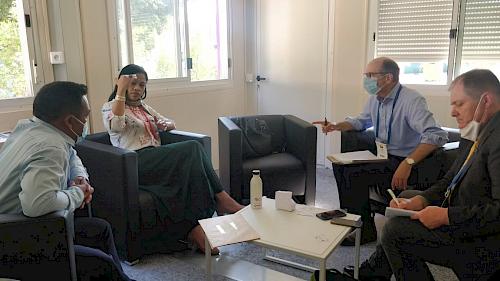[ad_1]
Madagascar is home to five percent of the world’s biodiversity, making it one of the richest and most unique ecosystems on the planet. A large number of species, including tree species, amphibians, reptiles, birds, and primates, are found only on this island, making them highly desirable trafficking targets for overseas markets.
The Memorandum of Understanding with TRAFFIC will bring a new dimension to MEDD’s work in the fight against the illegal trade in Madagascar’s wildlife which hinders the sustainability of trade and the governance of biodiversity.
Ms. Baomiavotse Vahinala Raharinirina, Minister of Environment and Sustainable Development of Madagascar
The MoU describes how MEDD and TRAFFIC will work together to strengthen surveillance, research and the capacity to effectively enforce and implement the regulations of the Convention on International Trade in Endangered Species of Wild Fauna and Flora. extinction (CITES) to fight illegal wildlife trade in and out of the country. The agreement was signed on July 22, 2021 on behalf of MEDD by Mr. Julien Noel Rakotoarisoa, Director General of Environmental Governance and Mr. Richard Scobey, Executive Director of TRAFFIC.
In September, MEDD and TRAFFIC delegations launched joint work under this new MoU at the IUCN World Conservation Congress in France, where Minister Baomiavotse Vahinala Raharinirina, Minister of Environment and Sustainable Development of Madagascar, met Richard Scobey. “Restoring the governance of Madagascar’s natural capital is a priority for the current government. With this in mind, we are committed to improving the sustainability of Madagascar’s wildlife to support national economies and local development. Strengthening CITES implementation is a key step in this direction, and our collaboration with TRAFFIC on CITES implementation is a promising and welcome step towards sustainable wildlife trade in Madagascar, â€said Mr. Rakotoarisoa on this occasion.
The state has pledged to “eradicate all trafficking in natural resources, including rosewood, turtles and other endangered endemic species of flora and fauna†through policy. TRAFFIC projects are designed to support the government’s priority of combating illegal wildlife trade as part of the Initiative for the Emergence of Madagascar.
“Madagascar is showing leadership in protecting wildlife and ensuring sustainable and prosperous local communities. We are committed to being an integral technical advisor as the Malagasy authorities draft and adopt a new national strategy to combat wildlife crime, â€said Richard Scobey.
Existing TRAFFIC projects such as INL-funded Law Enforcement in Madagascar: A United Response to Combating Wildlife Crime (LEMUR-CWC) will further support government efforts to reduce trafficking in wildlife. endangered wildlife species by strengthening investigative and law enforcement capacity to stop illegal activities. take and trade, build judicial capacity and encourage increased cross-border cooperation with neighboring countries.
With the support of the Durrell Wildlife Conservation Trust and TRAFFIC, MEDD and other government departments plan to convene a “roundtable†in the coming months to level the playing field and intensify joint efforts.
[ad_2]

